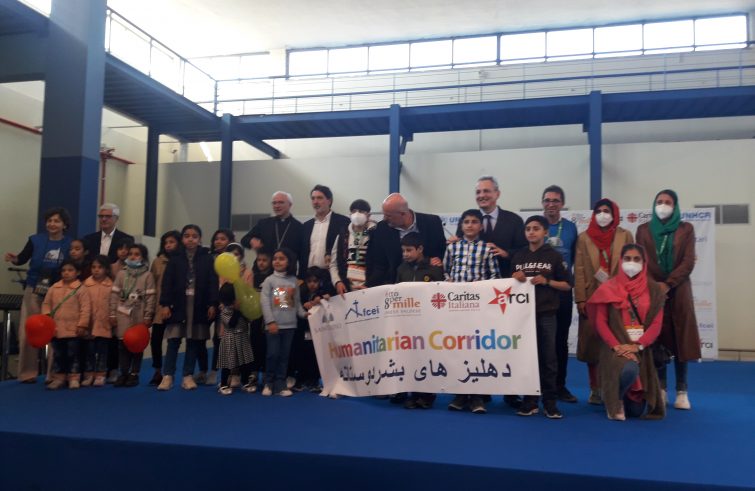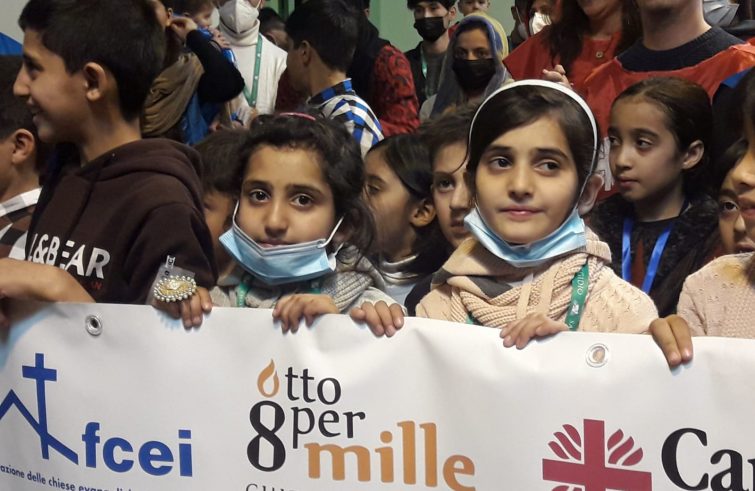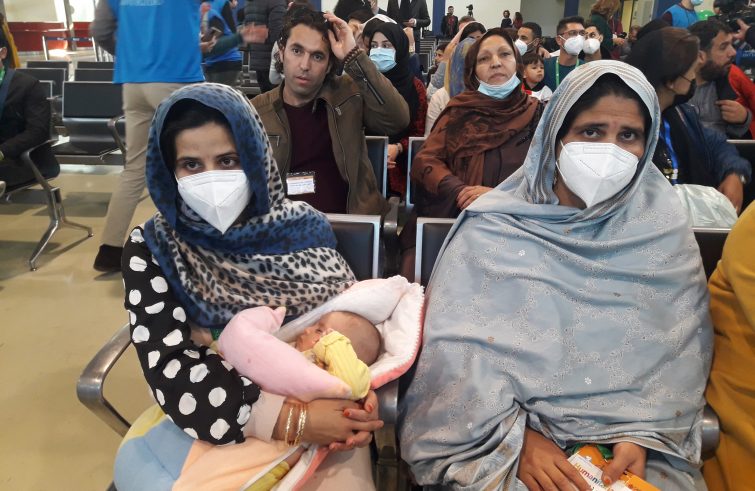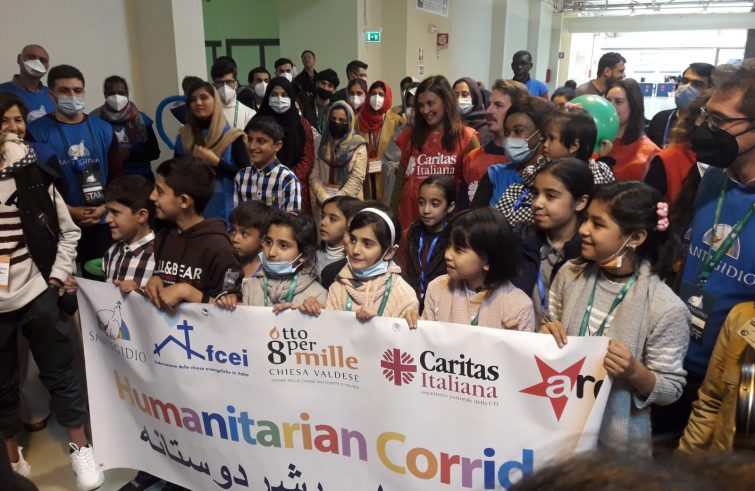
There are many children, 62, roughly half the total of 152 Afghan refugees who arrived at Fiumicino airport this morning on a flight from Islamabad, Pakistan. “Viva l’Italia!”, they cheerfully exclaim. Indeed, a joyous celebration took place this morning at Fiumicino airport. Upon their arrival, they found the warm welcome of all the organisations that worked to make this humanitarian corridor happen: the Italian Bishops’ Conference (through Caritas Italy), the Community of Sant’Egidio, the Federation of Evangelical Churches in Italy, Tavola Valdese, ARCI, IOM, UNMIPA and UNHCR in agreement with the Ministries of the Interior and Foreign Affairs. So many different entities, so many different realities will now be actively involved in providing support to these women and children along their path of integration: for children through prompt school registration and for adults, starting with Italian language courses and, once refugee status has been obtained, integration into the working environment.
 The vast majority – says Daniele Albanese, responsible for the humanitarian corridors at Caritas Italy – are extremely vulnerable persons who were forced to flee from Afghanistan but also from Pakistan where the Taliban have a strong presence. The group of men and women who arrived in Italy today includes human rights activists, international organisations personnel, doctors, magistrates. All of these people were working for women’s emancipation or for the creation of a democratic system over the years, and now they can no longer live safely in their home country. Among them there are even judges who prosecuted Taliban members over the past years and persons who worked with female victims of violence.
The vast majority – says Daniele Albanese, responsible for the humanitarian corridors at Caritas Italy – are extremely vulnerable persons who were forced to flee from Afghanistan but also from Pakistan where the Taliban have a strong presence. The group of men and women who arrived in Italy today includes human rights activists, international organisations personnel, doctors, magistrates. All of these people were working for women’s emancipation or for the creation of a democratic system over the years, and now they can no longer live safely in their home country. Among them there are even judges who prosecuted Taliban members over the past years and persons who worked with female victims of violence.
Their situations are diverse, but they all comprise the reality of people who were actively engaged in building a different Afghanistan and who unfortunately were forced to flee.
“The situation is deteriorating by the day”, we are told in perfect Italian by 25-year-old Hasibullah Aziri who arrived in Italy from Afghanistan in 2017. “The people are starving, the economy is virtually non-existent. There is no such thing as human rights anymore. Women are not allowed to go out. Girls cannot go to school. The only chance of a future today is to leave our country. But all the Afghans who left have the same dream: to return to our country one day and live in peace. It is also my dream, to return home.”
 “The humanitarian corridors send out the message that safe and legal reception routes are feasible,” said Msgr. Giuseppe Baturi,
“The humanitarian corridors send out the message that safe and legal reception routes are feasible,” said Msgr. Giuseppe Baturi,
General Secretary of the Italian Bishops’ Conference. “People fleeing or in need of a dignified life must not be left at the mercy of delinquents and criminals, that exploit human suffering to serve their financial gains. This is a global phenomenon. And its response must likewise be global.” The refugees who arrived today will be given hospitality in various regions and will be immediately placed on the path towards integration. These efforts show that Italy is open to welcome,” noted the General Secretary of the Italian Bishops’ Conference. “We are receiving encouraging signs that show that the churches are prepared to receive the refugees, they are pursuing a course of action that is not limited to welcoming them but also envisages their integration, offering opportunities for inclusion through Italian language courses, for example, and suggesting ways to enter the labour market and the school system.” With regard to Europe’s responsibilities, Msgr. Baturi repeats what Pope Francis has pointed out on several occasions: “it must be a concerted action, carried out at the European level.
But everyone must do their share. One must not refrain from taking steps until others have done so. We should all take steps. Our relationship with Europe must be based on dialogue, because a welcoming effort can only be an effort on the part of all.”
 “The pilot phase is over. The humanitarian corridors could become an Italian proposal to the whole of Europe to avoid deaths at sea and traffickers in human beings,” said the president of the Community of Sant’Egidio, Marco Impagliazzo. “The humanitarian corridors – he adds – have clearly shown that reception and integration can be combined, since the refugees who arrived in Italy to date have all been perfectly integrated. We need them, our economy needs them, our families need them, so we are asking Europe to give structure to this system so as to increase its numbers and motivations.” “This is the cry we want to send out to Italian and European politicians,” underlines Libero Ciuffreda, board member of the Federation of Evangelical Churches in Italy. What is sometimes deemed impossible is in fact possible. It is possible to welcome in a planned and coordinated manner, in a way that makes people look into each other’s eyes, shake hands and walk together. May we all enjoy the journey”. Thanks to a widespread reception network, over 5,300 refugees reached Europe thanks to this system, in addition to more than 1,800 Ukrainian citizens, welcomed by the Community of Sant’Egidio in a number of European countries. Other arrivals are expected in Rome from Lebanon and Libya in the coming days.
“The pilot phase is over. The humanitarian corridors could become an Italian proposal to the whole of Europe to avoid deaths at sea and traffickers in human beings,” said the president of the Community of Sant’Egidio, Marco Impagliazzo. “The humanitarian corridors – he adds – have clearly shown that reception and integration can be combined, since the refugees who arrived in Italy to date have all been perfectly integrated. We need them, our economy needs them, our families need them, so we are asking Europe to give structure to this system so as to increase its numbers and motivations.” “This is the cry we want to send out to Italian and European politicians,” underlines Libero Ciuffreda, board member of the Federation of Evangelical Churches in Italy. What is sometimes deemed impossible is in fact possible. It is possible to welcome in a planned and coordinated manner, in a way that makes people look into each other’s eyes, shake hands and walk together. May we all enjoy the journey”. Thanks to a widespread reception network, over 5,300 refugees reached Europe thanks to this system, in addition to more than 1,800 Ukrainian citizens, welcomed by the Community of Sant’Egidio in a number of European countries. Other arrivals are expected in Rome from Lebanon and Libya in the coming days.












